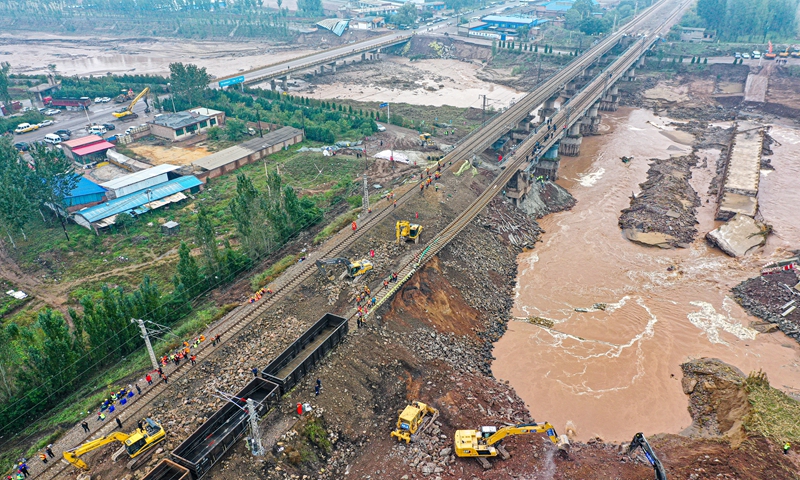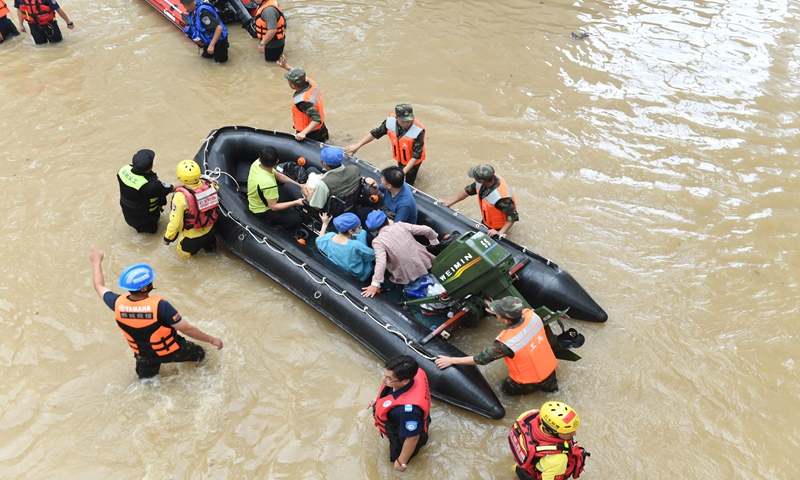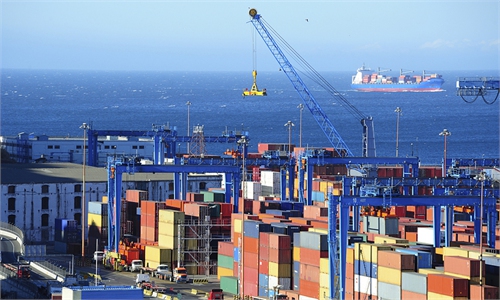Natural disasters will have limited impact on China's GDP, while certain industries may suffer
Natural disasters caused direct economic losses of $44.5 billion in China during Q1-Q3: report

The Railway on the Changyuan River bridge was reopened on Saturday in Jinzhong, North China's Shanxi Province. The railway that crosses the bridge was destroyed by flooding on Wednesday. Photo: VCG
The unexpected and unpredictable torrential rains seen in Central China's Henan Province throughout July are a sign of another challenging year in 2021, after the COVID-19 pandemic outbreak that significantly disrupted 2020.
Analysts estimated that the impact of natural disasters on the national economy will be limited. But they also warn that there will be impact on industries and provinces that are reliant on agriculture, an economic sector vulnerable to natural disasters.
In the first three quarters, the situation of natural disasters in China was complex and severe, with frequent extreme weather and climate events, according to a report on natural disasters nationwide in the first three quarters of 2021 released by the Ministry of Emergency Management on Sunday.
Natural disasters in the first three quarters of the year have affected 94.94 million people and caused the direct economic loss of 286.4 billion yuan ($44.5 billion).
The disasters have also led to 792 deaths or missing people, with over 5.262 million people were evacuated. Additionally, 157,000 houses collapsed with a further 1.751 million damaged to some extent, and 10.58 million hectares of crops have been affected.
But compared with the average of the same period in the past five years, the number of people affected by disasters fell by 31 percent, the number of dead or missing decreased by 14 percent, the number of collapsed houses dropped 16 percent and the economic losses also decreased by 14 percent, according to the report.
Natural disasters mainly include floods, hail, droughts, typhoons, earthquakes, geological disasters, and damage caused by frost or ice, snow disasters, sandstorms, forest and grassland fires and marine disasters.
Limited impact on GDP
Liu Xuezhi, a senior macroeconomics expert at the Bank of Communications, told the Global Times on Sunday that he estimated the impact of natural disasters had on the national economy will be limited.
Liu said the disasters are seasonal and not persistent, and that the recovery and rebuild work in wake of the disasters would make up for a proportion of lost GDP.
The loss for the first three quarters of the year reached more than 280 billion yuan, while China's GDP last year reached 100 trillion yuan, so the impact on numbers is not unmanageable, Liu said.
When analyzing different economic sectors, natural disasters tend to have bigger negative impact on agriculture. In general, heavy rains andfloods cause less economic damage than earthquakes and volcanic eruptions, analysts said.
But some of the areas affected by the current floods, such as Henan and Shanxi, are heavily dependent on specific industries, such as agriculture in Henan. Therefore, there is some continuity to the economic impact, depending on the recovery and reconstruction, said analysts.
For instance, Henan, with a GDP of $5.9 trillion yuan in 2020, lost $114.3 billion yuan resulting from torrential rains, according to official data. The added value of primary industry, or agriculture, of Henan in 2020 stood at 535.4 billion yuan, accounting for 9.7 percent of total GDP.
The direct economic loss mainly comes from agriculture, with the affected area of crop estimated to be 16.356 million mu (1.09 million hectares). The loss caused by natural disaster accounted for nearly 20 percent of the agriculture sector in Henan.
The maximum precipitation in Zhengzhou, Henan's capital, reached 201.9 millimeters per hour, according to the national meteorological observatory. That means the city Zhengzhou experienced rainfall each hour equivalent to that of 106 West Lakes.

Rescue teams transfer stranded patients and medical staff to Fuwai Central China Cardiovascular Hospital in Zhengzhou, Central China's Henan Province, on July 22, 2021. Photo: VCG
Certain industries hit
Wan Zhe, chief economist at the China National Gold Group Corp, told the Global Times on Sunday that the way GDP is calculated means that not much difference will be noted in GDP figure unless the country experienced a catastrophe of historical proportions.
However, each natural disaster will have an effect on the economy.
"Once production or services are interrupted, especially such an interruption is prolonged, local economy will suffer and employment rate will suffer, too," Wan said.
A university student surnamed Yang, who comes from Taiyuan, capital of Shanxi Province, has had his life temporarily turned upside down by the seasonal downpour of rain.
"I was noticed that trains were suspended due to the heavy rain for safety reasons," Yang told the Global Times on Sunday.
He was supposed to take a high-speed train to come back to Beijing on Thursday after the National Day holiday for course on Friday morning. Currently, Yang is still stuck at his home and is taking courses online.
"In Shanxi, for instance, as we see railway transportation is cut off by floods at certain points, there could be impacts on the transportation of coal. Coal mines, usually located in the rural areas, could also be impacted," Wan said, noting that local tourism could also suffer especially if some valuable cultural heritages are permanently damaged.
However, Wan said the major coal producer has since years ago began to diversify its source of income and balance its overreliance on coal-related industry so the exact impact of the floods is still difficult to say for the moment.
Generally speaking, Wan said torrential rainfalls and floods cause less economic damage than earthquakes and volcano eruptions.



